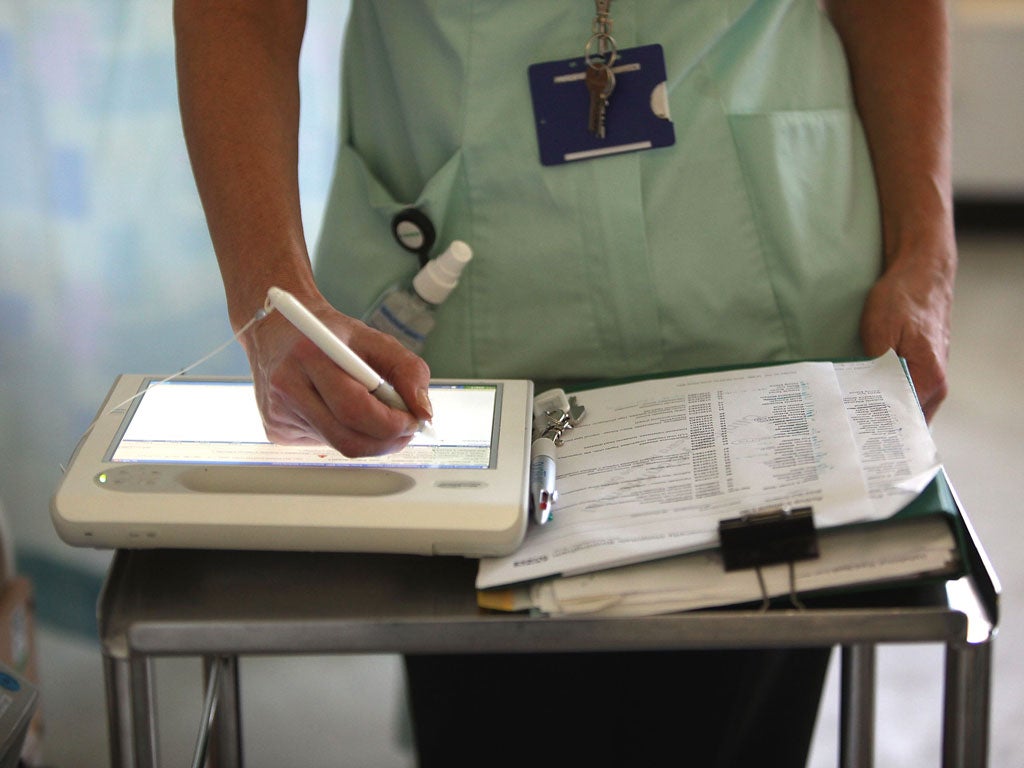NHS 'cover-up' over lost cancer patient records
Thousands awaiting treatment were kept in the dark for five months when data disappeared

Britain's largest NHS trust took five months to tell patients it had mislaid medical records for thousands of people waiting for cancer tests and other urgent treatments. Imperial College Healthcare NHS Trust discovered in January that a serious computer problem and staff mistakes had played havoc with patient waiting lists.
About 2,500 patients were forced to wait longer on the waiting lists than the NHS's targets, and the trust had no idea whether another 3,000 suspected cancer patients on the waiting list had been given potentially life-saving tests. Despite the fact that the trust discovered discrepancies in January and was forced to launch an internal review into the mess, including 74 cases where patients died, it did not tell GPs about the lost records until May.
Revelations about the delay prompted a furious response yesterday from GPs, local authorities and patients' groups. Dr Tony Grewal, one of the GPs who had made referrals to Imperial, said doctors should have been told sooner to allow them to trace patients whose records were missing. "The trust should have contacted us as soon as it was recognised that patients with potentially serious illnesses had been failed by a system," he said. "GPs hold the ultimate responsibility for their patient care."
The chief executive of the Patients Association, Katherine Murphy, added: "This is unacceptable for any patient who has had any investigation, but especially patients awaiting cancer results, where every day counts. The trust has a duty to contact GPs who referred the patients. It's unfair on the patients to have this stress and worry, and the trust should not have tried to hide the fact that they had lost these records. They should have let the GPs know at the outset."
The trust defended the delay in alerting GPs, arguing that it needed to check accurately how much data it had lost before making the matter public. It said a clinical review had now concluded that no one died as a result of patients waiting longer for tests or care.
Despite this, three London councils – Westminster, Kensington and Chelsea, and Hammersmith and Fulham – are deeply critical of the way the trust handled the data loss. Sarah Richardson, a Westminster councillor who heads the council's health scrutiny committee, said that trust bosses had attempted to "cover up" the extent of the debacle. "Yes, they've done what they can but, in doing so, [they] put the reputation of the trust first," she said. "Rather than share it with the GPs, patients and us, they thought how can we manage this information internally. They chose to consider their reputation over patient care."
Last week, it was revealed that Imperial has been fined £1m by NHS North West London for the failures that led to patient data going missing. On Wednesday, an external review into the lost records said a "serious management failure" was to blame for the blunder.
Imperial's chief financial officer, Bill Shields, admitted at a meeting with the councils that the letter could have been produced more quickly. He said that, at the time, the trust had operated with "antiquated computer systems" and had a "light-touch regime" on elective waiting times.
Terry Hanafin, the leading management consultant who wrote the report, said the data problems went back to 2008 and had built up over almost four years until mid-2011. Mr Hanafin said the priorities of senior managers at that time were the casualty department and finance.
He further concluded that while the delays in care turned out to be non-life threatening, they had the potential to cause pain, distress and, in the case of cancer patients, "more serious consequences".
Imperial's chief executive, Mark Davies, admitted yesterday that the failings of the systems, management and record-keeping between 2008 and 2011 were "clearly not acceptable". He added: "I am only too aware that both the poor standard of record-keeping in the past and the measures we have had to take to address this may have resulted in concern for patients and their families, and I would like to apologise unequivocally for any distress that might have been caused."
The trust said it had found no evidence of clinical harm and stressed that new systems have now been implemented to record patient data. It denied trying to cover up its mistakes or put its reputation before concerns for patients. "Patient safety is always our top priority," said a spokesman.
Join our commenting forum
Join thought-provoking conversations, follow other Independent readers and see their replies
0Comments